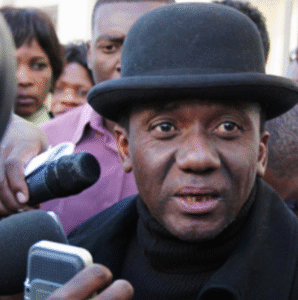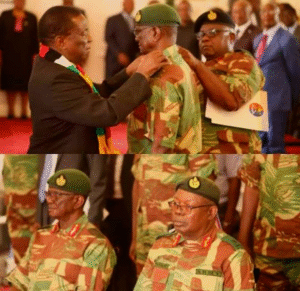MNANGAGWA’S TIGHTROPE WALK OVER CHIVAYO SCANDAL

In a complex web of political intrigue and alleged corruption, Zimbabwe’s President Emmerson Mnangagwa finds himself in a precarious position over the unfolding scandal involving ex-convict tycoon Wicknell Chivayo and the Zimbabwe Electoral Commission (Zec) tender. This situation presents a dilemma for Mnangagwa that is nothing short of a Shakespearean tragedy: he is “damned if he does, and damned if he doesn’t.”
At the heart of this scandal is Wicknell Chivayo, a businessman whose past is as colorful as it is controversial. Recently, Chivayo has been implicated in a corruption case involving a tender from the Zec. However, the implications of this case stretch far beyond a simple legal matter, threading through the upper echelons of Zimbabwe’s political hierarchy.
Chivayo claims to have Mnangagwa under his control, a bold statement that has stirred the political pot significantly. His confidence suggests he holds leverage that could expose deeper layers of corruption within the Zimbabwean government if he were to face arrest. This assertion puts Mnangagwa in a tight spot. Arresting Chivayo could potentially open a Pandora’s box of revelations that the President might prefer kept closed.
However, the alternative is no less appealing. Choosing not to arrest Chivayo could be seen as a confirmation of the tycoon’s claims that he has the President in his grip. This would severely undermine Mnangagwa’s authority and reputation, painting him as a leader who is manipulated by external influencers with dubious pasts.
This scandal also envelops other high-profile figures, such as the Chief Secretary to Cabinet Martin Rushwaya, Zec Chairperson Priscilla Chigumba, and Central Intelligence Organisation Director-General Isaac Moyo. All are reported to be close to Mnangagwa, with some being related to him, which complicates the situation further. Their involvement suggests that the ramifications of this scandal could ripple through the entire fabric of Zimbabwe’s governance.
The stakes are incredibly high for Mnangagwa. On one hand, he faces losing his grip on power and authority if Chivayo’s allegations prove to be true or if he appears to be influenced by the tycoon. On the other, cracking down on Chivayo could unleash a slew of allegations and evidence that might implicate his office and close associates in corrupt activities.
Moreover, this scandal emerges at a time when Mnangagwa’s administration is under considerable scrutiny both from within Zimbabwe and internationally. The President has been attempting to portray his regime as a break from the past, committed to fighting corruption and implementing reforms to revive the struggling Zimbabwean economy.
For Chivayo, the situation appears to be a win-win. He has boldly claimed to have nothing to lose and everything to gain. His audacious stance and public declarations could be seen as a strategic move to fortify his position by ensuring that any action against him could have detrimental consequences for the government.
In this high-stakes political game, the paths ahead are fraught with danger for Mnangagwa. The decision he makes regarding Chivayo’s fate could very well define his presidency. It is a stark reminder of the intricate and often perilous nature of political power in Zimbabwe, where allegiances are fluid, and authority can be both a shield and a sword.
As Zimbabweans watch this drama unfold, the broader implications for the country’s political landscape and its fight against corruption are significant. This scandal not only tests the resilience of Mnangagwa’s leadership but also the strength of the nation’s democratic institutions. Whether Mnangagwa can navigate this political minefield without sacrificing his credibility or exposing systemic corruption remains to be seen.




